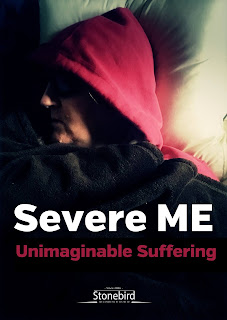Why does the ME Community have to endure CG53 ?
Stonebird
Greg
Crowhurst
It is a great concern to see a
leading Consultant being quoted in the Sunday Times apparently
stating that:
“Doctors are failing to diagnose
ME, through neglect, ignorance or cold feet because it is
controversial. There are perfectly good Nice[National Institute for
Health and Care Excellence] guidelines telling every GP how to
diagnose it.”
http://www.thesundaytimes.co.uk/sto/news/uk_news/Society/article1464782.ece
It is important, though, to view the
Consultant's comments in context.
The Sunday Times article was an
exposure of the terrifying situation where families, who have a
child with ME are placed under investigation by Child Protection
Officers who “disagree” with their diagnosis.
In that situation, the deeply flawed
NICE guidelines (CG53), are probably better than nothing,
nonetheless, condemned by virtually every ME organisation in the UK,
they are widely considered to be not fit for purpose, for example :
- NICE failed to include experts from all the relevant professional groups on the Guideline Development Group ( GDG)
- Patients' / carers' views were not given equal weighting and status, as subsequently confirmed by two members of the GDG.
- By limiting their consideration of the literature to that which supports the psychiatric paradigm of ME, NICE exhibited intrinsic psychiatric bias and failure to take account of the available published biomedical evidence about ME, without knowledge of which the Guideline fails to provide an aid to diagnosis (as was its remit).
- The sole management recommendations are based on weak and inconclusive studies of dubious quality on heterogeneous groups of people, the majority of whom are unlikely to have ME but may have suffered from any one of over 30 other disorders where "fatigue" is a symptom.
- The Guideline's conclusions did not coincide with the majority professional view of the international medical and scientific communities about ME.
- NICE confused ME with other conditions and fatigue states and have poorly married together two opposing views : the psychiatric model which says "unhelpful illness beliefs", "thoughts, feelings, behaviours" and "over-vigilance to symptoms" perpetuate the illness and the biomedical model, which validates the physical illness. This has led to a flawed document that meets no-one's real need, with a predominance of psychiatric interpretation.
- NICE recommended that laboratory tests, which in other countries have helped to establish the organic nature of ME/CFS and which point to potential therapeutic interventions, should be specifically forbidden in the UK.
- NICE disregarded the fact that patients are almost universally opposed to CBT and to GET, because survey after survey has shown that GET can be harmful to people with ME.
- NICE has produced Guidelines for 19 different clinical conditions. Only in the case of the organic disorder ME is CBT recommended as the primary treatment of choice.
In addition, as Margaret Williams
(2007) has extensively documented, NICE appears to be in breach of
the AGREE guidelines, a rigorous methodological process it is
expected to follow in drafting clinical guidelines.
Recently I was involved with Michael
Evison in drafting a question, to ask NICE at a public Question Time:
“unfortunately” , through an “administrative error” the
question did not get asked live. However, in their reply NICE
acknowledged the misgivings people with ME, especially Severe ME have
about the Guideline.
Here is the question, followed by
relevant extracts from NICE's reply:
"I'd
like to ask how NICE can justify the current guidelines for ME, when,
in breach of the AGREE Instrument (The Appraisal of Guidelines for
Research and Evaluation) to which it is obliged to conform. NICE
ignored the literature, over 4000 published papers on biomedical
aetiology, excluded from consideration research, for example on
cardiac anomalies, that directly impinges on the safety of its
recommendations for Graded Exercise and according to a patient rep,
who resigned from the CDG, did not fully taken into account patient
evidence ?"
In their reply NICE acknowledged that
the guidelines do not address the needs of the severely affected :
"We are aware of the strength
of feeling from people with CFS/ME and people who care for them that
our guidance doesn’t address the needs of the most severely ill. We
are also aware of the ongoing concerns of patients and CFS/ME groups
regarding the level of research into these conditions, the lack of
services and treatments, and the support available for patients, on
which we have received numerous comments since publication of the
guideline in 2007. "
Yet
still they have placed
their flawed guidance on the static list for a further 5-10 years.
"In terms of updating our
guideline, we considered whether the guideline warranted an update in
2010/11 but found no substantive evidence to suggest that a
significant change in clinical practice was needed. We have since
reviewed this decision again with stakeholders (late 2013) and
consulted on our plans to move the guideline to the static list.
Clinical guidelines placed on the static list will be reviewed every
5 years to determine if they should remain on the static list, and
consideration will be given to transferring the guideline back to the
active surveillance list if the high level review at 5 years yields
new evidence which may impact on the guidance. We understand most of
the current research is biomedical and not expected to impact on the
current guidance for 5 – 10 years.”
The NICE Guidelines fail to identify
or address the medical needs of the most severely affected, this,
alongside their many other failings, makes them far from "perfectly
good"; this raises the
question, why does the ME
Community has to endure this
injustice, with no hope of a change in focus, for up to another
decade ?
References :
Margaret
Williams (2007) Comments
on the NICE Guideline on “CFS/ME”:




Comments
Post a Comment